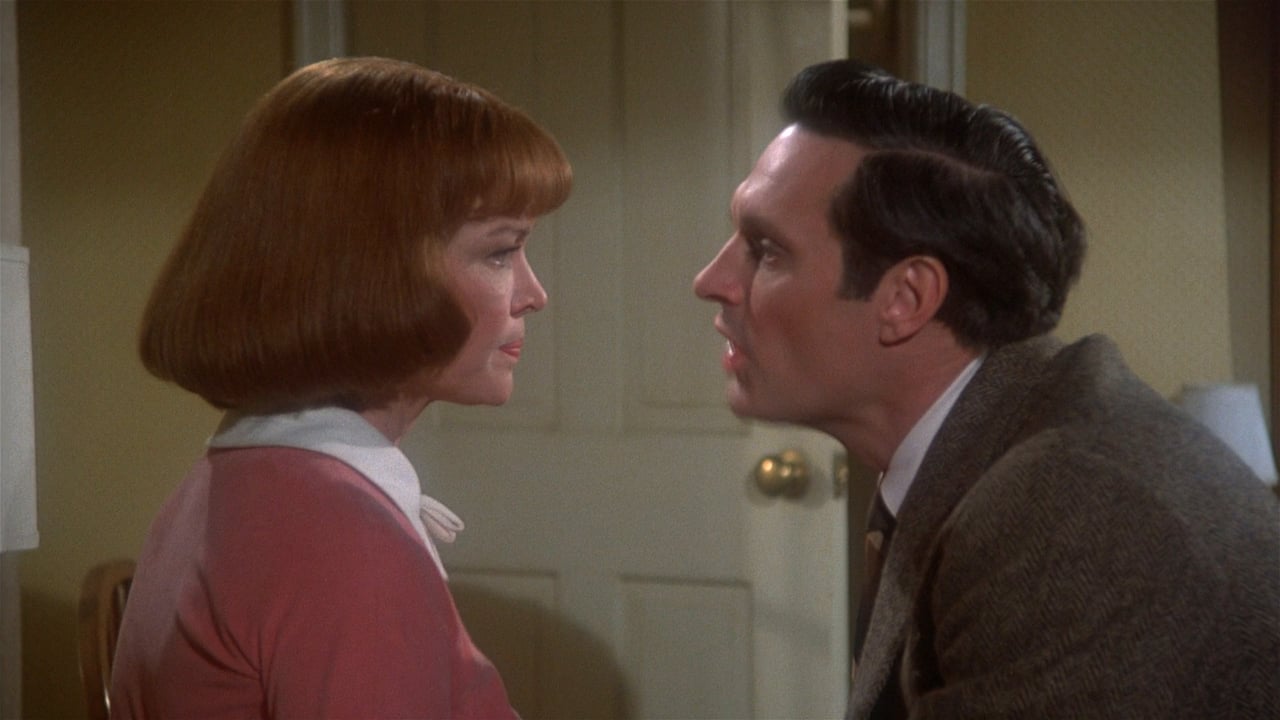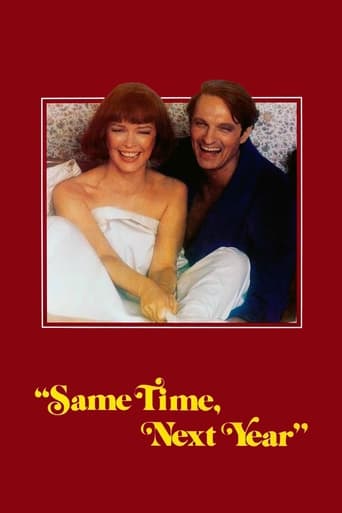Linbeymusol
Wonderful character development!
Interesteg
What makes it different from others?
Supelice
Dreadfully Boring
Nicole
I enjoyed watching this film and would recommend other to give it a try , (as I am) but this movie, although enjoyable to watch due to the better than average acting fails to add anything new to its storyline that is all too familiar to these types of movies.
Katerina Robertovla
This was a movie that should have been a 21 minute sitcom episode. The minute I heard that sickeningly sweet, syrupy song sung by Johnny Mathis (Mr. Wobbly Vibrato himself) and Jane Oliver I knew this movie was doomed. The other thing is I just don't find anything remotely romantic about Alda and Burstyn. When Ellen Burstyn's character showed up in her hippie phase I just rolled my eyes and thought what BAD acting. I bet both Burstyn and Alda were very self satisfied with their performances. In the final scene, it is just one beige color after another. Ellen is wearing beige, Alan Alda is wearing beige, the furniture is beige. Even Ellen's wig is beige. I guess that kind of sums this movie up for me. It is a very beige movie.The only costume I liked on (blonde-wigged) Ellen Burstyn was the gorgeous black dress she wore with the rhinestone brooch and her lovely shiny dangle earrings. This, I believe, was their second meeting. Unfortunately for me, this is the one thing that I liked about the movie. Yes sadly I liked her black dress. That was it.
mark.waltz
Back in the day when you could go to the movies and not have your ears blown out with over-the-top sound and special effects created by some computer (although this was just the year after "Star Wars"), movies with themes usually found today on Lifetime were theatrically released and were classy, not sappy. Broadway plays were transfered to the screen, maybe not entirely faithfully, and the results were usually above average. In the case of this hit mid 1970's two character play (which originated with Ellen Burstyn and Charles Grodin in the leading roles), Burstyn gets to repeat her role, and Alan Alda, then one of the biggest stars on TV and in an occasional movie, took over the male role. They play two married people who meet by chance on the California coast, fall into an affair which neither of them planned, and end up seeing each other once a year because they just can't live without each other, yet they can't get rid of their unseen spouses, either.The film starts in 1951 after the audience is swept away by the beautiful "The Last Time I Felt Like This", sung by Johnny Mathis and Jane Olivor. The song is heard over the film, reflecting the passages in time, the political and social ramifications often taking over the character's lives when they meet up without even having spoken to each other since the last time they bid adieu. At first, Burstyn is a rather insecure young married woman, admittedly a high school dropout and with no more ambitions than continuing to be a housewife and mother. Alda is an accountant, and both are fairly young and innocent as they deal totally differently with the guilt they face of cheating on their partners. But as they think they'll never see each other again, they totally let go of their inner insecurities, and before parting, it is obvious that this will be a regular anniversary get-together for them.Five years, ten years, fifteen years, twenty-one years, and finally twenty seven years pass by, and we see not only the passage of time but how each of their lives have changed. The two get to know each other's spouses and children without ever even meeting them, and as the world changes, you begin to see deep changes within them. At one point, Burstyn is a Berkeley hippie (abliet the oldest one on campus) and Alda is a stuffy accountant seemingly embarrassed by her wardrobe and actions. But there's always more to these characters than what they perceive themselves to be on the surface, and like each visit before (including one where Alda helps a very pregnant Burstyn have her baby!), they find their way back to each other.There are moments of heartbreak and many humorous incidents. Both actors play extremely well off each other, and you can't judge them for their infidelities. In fact, the more you listen to their reasoning, the more you understand that it is their love for each other which has actually been responsible for saving their perspective marriages. There are moments where you will find yourself reaching for a handkerchief and laughing at the same time, and the ending, while potentially bittersweet, is downright hysterical if predictable. But that's O.K. By the time the story is done, you'll feel that you've known these characters for 27 years as well (even if your only 25!) just like each of them felt they knew the others spouse.
dataconflossmoor
This is where it all begins, the preclusion, the preliminary- "Yes, I like sunsets on the cape". "Yes,I love the ocean breeze". "Yes, I like innocuous jokes about unexplained human shortcomings".. "Most of all, I love this apparently kindred spirit we have with regards to being cavalier about commitment".. "Yes, I'm bored!" "Yes! I'm smug and ambiguous!" "Yes! I'm Italian and you're Irish, so if we had kids together, not only would they learn how to love life, they would also know how to survive in it!" Let's give it the old college try, shall we! Alan Alda and Ellen Burstyn play a socially derivative couple who both love each other because both of them love their spouses! Originally a stage play, "Same Time Next Year" articulates a distinct form of human emotion that is identifiable to any person who becomes cajoled by individual adversity. Infidelity became the necessary prescription for conducting their regimented lives properly. As time went on, the social changes in American behavior wound up being the antagonist for these two "lovebirds" to appropriate their persistence for this precariously prevailing situation. Eventually, their resilience required a modicum of romantic interlude to sustain the tedium of their auspiciously monotonous marital routine. The bittersweet amelioration which both Alan Alda and Ellen Burstyn worked so painstakingly hard to attain, ultimately becomes an utterly acute reflection of mandatory human error. Basically, the audience gets it, or, at least, they should! Alan Alda and Ellen Burstyn are very believable in this film! Richard Mulligan, the director, does a remarkable job at itemizing the comedic chaos to this movie. The cinematography is wonderful! The song: "The Last Time I Felt Like This", was a blockbuster hit for weeks on end back in 1978. A definite thumbs up! See this '70's classic, should you have the impetuous yearning to engage in a corrupt candor for realistically entertaining yourself!
TBJCSKCNRRQTreviews
I haven't seen the play that this film is based on, though I do see how it could work as a play. The film adaptation does perhaps not particularly add something specific to the media of film, but I'm not sure the piece needed it or called for it... it could very well have served as nothing but a distraction. The basic setup is fairly simple... but simplicity is only a bad thing when the production calls for something else. The themes and characters are quite complex, and the film is compelling. The story is interesting and well-told, and it's paced right. The acting is downright impeccable in parts, and never bad. The portrayals are amazing, and the parts fleshed out and full. The writing is excellent. Deep, profound and interesting. The development, throughout this production, leaves immeasurably little to be desired. The leads are somehow appealing, and you do manage to forgive them for the obviously morally wrong activity they engage in. The costumes are also nicely done, as is the make-up, if the latter could perhaps be done better today. One thing that should be noted is that children should not watch this. The dialog, whilst magnificent, does hold some language that isn't fit for younger ears. It is a film for more mature audiences, in any case. I recommend this for anyone who isn't too young, and particularly couples. 7/10

